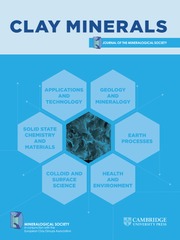Article contents
A new way of assessing clay cation adsorption using normalized salt concentration
Published online by Cambridge University Press: 09 July 2018
Abstract
Kaolinite cation adsorption data are processed using recent gas adsorption concepts such as the undersaturation ∆m = ln (C/Cs) and the monolayer coverage y. This process shows that using the proper reference phase through its solubility Cs, it is possible to characterize adsorption sites that have the same adsorption energy regardless of the nature of the cation. Under mildly acidic conditions, a single ‘Langmuirian’ site category fits cation adsorption data whereas another family of sites is revealed in mildly alkaline conditions. These results suggest that at mildly acidic pH, only silanol sites are available to ion exchange and adsorption whereas at higher pH, a wider range of sites is made available, some of them displaying the same average adsorption energy and the others constituting a different category of sites with a much lower adsorption energy. This latter category is attributed to the aluminol sites.
- Type
- Research Article
- Information
- Copyright
- Copyright © The Mineralogical Society of Great Britain and Ireland 2003
References
- 6
- Cited by


